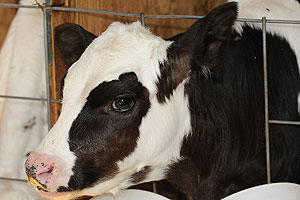Healthy Calf Conference
Follow to stay up-to-date on all Healthy Calf Conference updates. Speaker announcements, sponsorship information, registration announcements, and more.

Research in the last few years has clearly demonstrated that the overall health of a young calf and how they are managed imprints how they are going to perform as older animals.
Cattle do not directly pass immunity on to their offspring during pregnancy, so it is important to protect them early to give them a healthy start. There several steps to do this, but the most critical is colostrum management. Comfortable environment and strategic vaccination are other important steps.
“Every farm is a different environment and communications between the farm and a veterinarian is important to set up a protocol for vaccines,” says Dr. Randy Graham, Senior Manager of Veterinary Services for cattle with Zoetis. “As a basic protocol, we want to protect against respiratory viruses and bacteria.”
This includes Infectious Bovine Rhinotracheitis (IBR), Parainfluenza-3 virus and Bovine Respiratory Syncytial virus (BRSV), among others. Although a calf’s immune system is developed and responsive to foreign antigens during in the last trimester of pregnancy, it is still immature and not considered fully functional until several months of age. This is why immunity from its mother through colostrum in the hours right after birth is so critical.
“Even though immature, right from birth the immune system is developing and research has shown that it will respond to good vaccines,” says Graham, adding many questions still remain about how early a calf can be vaccinated for maximum response. “It’s generally thought that it is better to vaccinate and take advantage of the response you do get as opposed to not vaccinating at all.”
Often vaccines are constructed in combinations so that one vaccination will protect the calf against multiple threats. This is to reduce the workload for producers and make it easier to administer the vaccines. Responding to the multiple antigens in the combination vaccines should not be a problem for the calf as long as it is stress-free and fed properly so it has adequate energy to feed the immune system.
Most vaccinations are recommended just ahead of weaning, grouping or other stressful events in a calf’s life. A real game changer, however, has been an intranasal vaccine, called Inforce 3, introduced by Zoetis in September 2011. It is given to calves as early as seven days of age or less to control respiratory disease, especially BRSV.
Traditional vaccines rely on the systemic immune system to generate longer-lasting immunity that will help animals produce antibodies if they come into contact with a disease. The intranasal vaccine specifically targets only the local immune system of the calf’s upper respiratory tract or nasal mucosa, and can be given to calves before they leave their farm of origin or once they arrive at their new location.
“By stimulating production of antibodies locally through intranasal vaccination, we can intercept invading viruses to keep them in the calf’s upper respiratory tract and prevent them from getting into the lungs,” explains Graham. “This exposure to vaccine is not blocked by maternal antibodies so we don’t have to worry about interference from antibodies in colostrum. The vaccine can be given at a very young age and clinically, it has proven to be very effective.”
In addition to a good source of colostrum and following a vaccination protocols, two other essentials to good calf health are:
It is important that calves receive colostrum and are given enough milk in the first few of weeks of life until they are properly adapted to solid feeds. Graham advises producers to ensure they’re not underfeeding their calves and to make sure they receive enough nutrition for desired growth and to compensate for increased needs in colder temperatures. The immune system is one of the biggest draws of energy in any animal and a calf that is already starving for energy due to not being fed properly will struggle with growth and proper immune function.
A calf should be housed in a clean, dry and warm environment. A cold and wet environment will place more stress on the calf, hindering growth and development of its immune system, reducing its ability to fight off infection.
Follow to stay up-to-date on all Healthy Calf Conference updates. Speaker announcements, sponsorship information, registration announcements, and more.
The Codes of Practice are nationally developed guidelines for the care and handling of farm animals. They serve as our national understanding of animal care requirements and recommended practices.